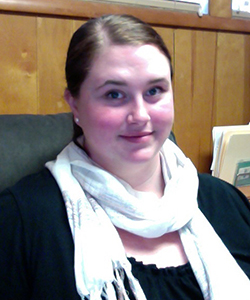 Dec. 3, 2014 – Nestled on the shores of Lake Superior, Ashland is home to some of Wisconsin’s most beautiful scenery, as well as a community that is now benefitting from the work of one dedicated attorney: Kimberly Lawton.
Dec. 3, 2014 – Nestled on the shores of Lake Superior, Ashland is home to some of Wisconsin’s most beautiful scenery, as well as a community that is now benefitting from the work of one dedicated attorney: Kimberly Lawton.
A 2010 graduate of the Nebraska College of Law, Lawton moved to Ashland several years ago to start her own practice. Now she’s making a difference by accepting low-income clients and helping to develop a free legal clinic, among other things.
What kind of pro bono work are you doing now?
I’m a participating attorney with Wisconsin Judicare, so I accept clients who have been prescreened for financial need through that organization. I help Judicare clients with bankruptcy and family law issues. Most of the family law clients I help have been victims of domestic violence. I also participate in a medical-legal partnership in our area in collaboration with Northlakes Community Clinic. We will be having our first free legal clinic at Northlakes on December 3 this year. Because I have a solo law practice in a community with a fairly high rate of poverty, even families with full-time jobs often can’t afford a lawyer, so I have to be more creative in my financial arrangements with clients. I do some reduced fee work and I’m excited about the new rule changes designed to encourage more limited scope representation.
How did you become involved with pro bono work in Wisconsin?
About the State Bar Pro Bono Initiative
The State Bar Pro Bono Initiative is a statewide-coordinated program to support, recognize, and increase lawyers’ volunteer legal efforts. In collaboration with the judiciary, legal services providers, and local bar organizations, the initiative works to improve public access to the legal system by promoting solutions that eliminate barriers to effective access to the civil justice system.
The Pro Bono Initiative, developed by the Legal Assistance Committee and approved by the Board of Governors in May 2004, has been a steady source of State Bar support for pro bono in Wisconsin. In addition to startup grants, it also encompasses a number of member benefits such as free malpractice insurance coverage for volunteer service in State Bar-sponsored pro bono projects and reimbursement for out-of-pocket expenses that members incur handling pro bono cases (filing fees, mileage, copying, etc.).
Find out more about how to volunteer and the benefits available at www.wisbar.org/probono.
I’ve been a volunteer in some form or another since high school. When I graduated from the University of Nebraska-Lincoln School of Law in 2010, there weren’t many jobs available for new lawyers. So, I started off working in a non-legal position at the Wisconsin Department of Corrections in Madison. In order to gain experience as a lawyer, I started volunteering with the Restraining Order Clinic in Dane County, Family Law Assistance Center, and Community Justice, Inc. Eventually, I decided that if I wanted to be a lawyer full time, I was going to need to create my own job. Other people who knew about my interest in social justice issues suggested that I should talk to a lawyer up in Ashland, Ron Stauske. Ron and I had lunch and before long I moved to Ashland to open up a law office in what was then his building. When I moved to Ashland, my interest in volunteering to help others continued. The new legal clinic we are starting with Northlakes Community Clinic builds on the medical-legal partnership that Ron started. Ron’s commitment to helping others was evident and I was very inspired by him.
What’s it like doing pro bono work in a smaller community?
When we moved, we were new to the area but loved it so much my husband’s parents moved here too. The legal community in Ashland-Bayfield Counties has been especially welcoming. Over the couple years I have been here, I have made such valuable connections. Ron became my mentor and was a tremendous help to me. Because it’s a smaller community, I’m also connected to more of the community organizations that also serve the needs of the people I help. I make a special effort to attend community services meetings to understand the resources and services available. It’s a great way to get the word out about new resources, including legal resources for low income people. There is a real sense of community in this area, and I am so happy to be a part of it.
How does your pro bono work help your community?
For my Judicare clients, the help I provide makes a big difference in their lives. Many times taking Judicare cases help people who would not otherwise have representation. The free legal clinic that we’re starting and the other pro bono work that I do to help people understand their rights. The clinic can hopefully be a bridge to connect people to the resources already available to them and help them help themselves. I can’t always provide all the help that a person needs, but I can usually do something to help and point them in the right direction.
You Might Also Like …
